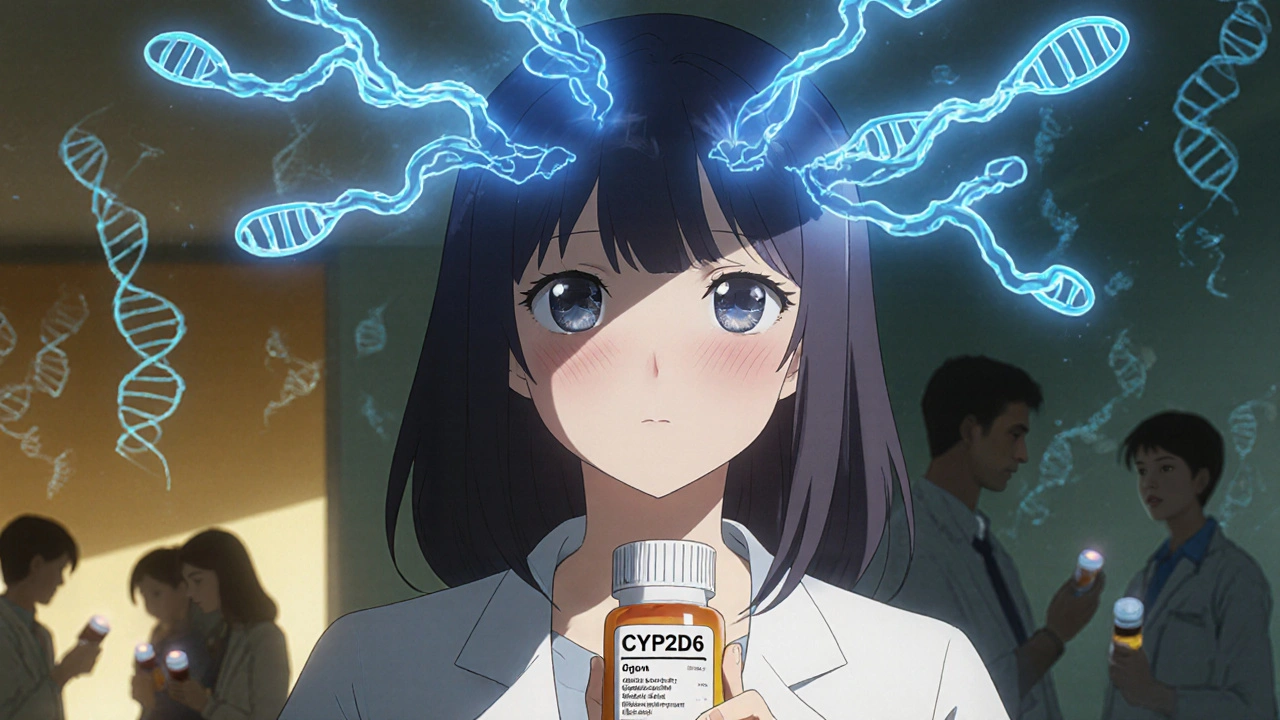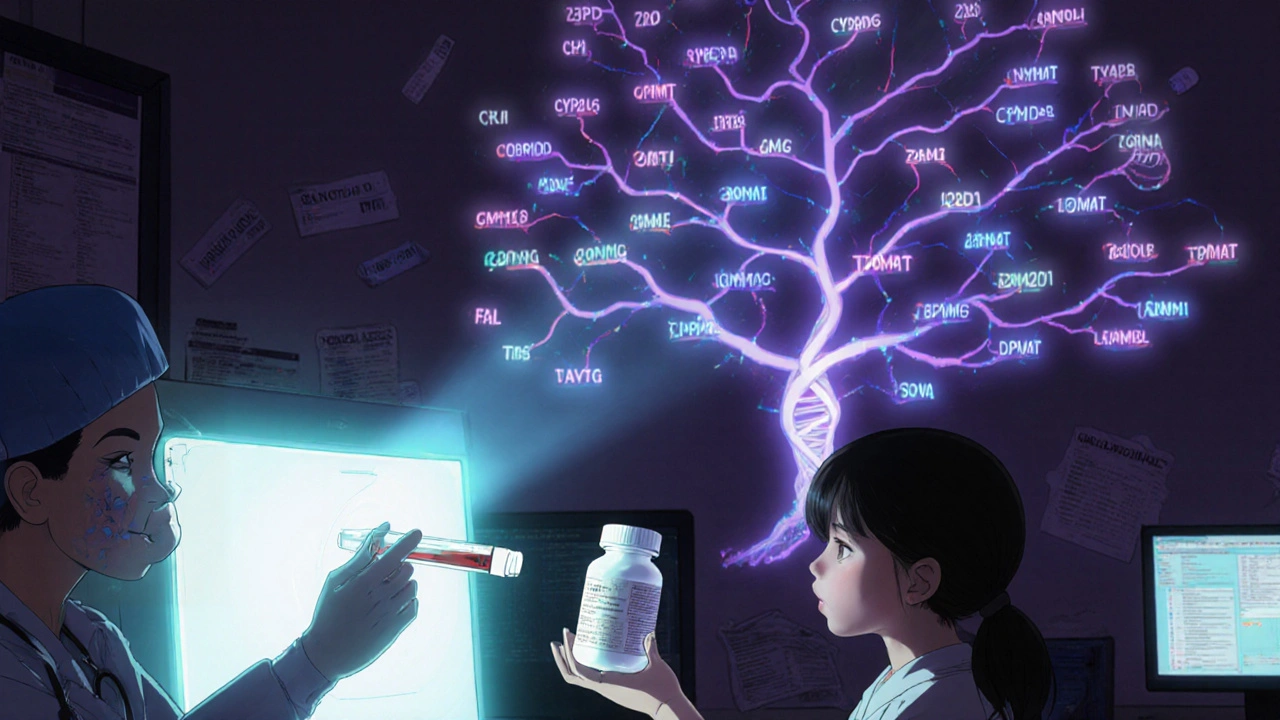How Family History and Genetics Affect Your Response to Generic Drugs
 Nov, 14 2025
Nov, 14 2025
When you switch to a generic drug, you expect the same results as the brand-name version. But what if your body doesn’t respond the same way - not because the pill is different, but because of your genes? This isn’t rare. For many people, family history and inherited genetic traits directly shape how well a medication works, or whether it causes dangerous side effects. Generic drugs are chemically identical to their brand-name counterparts, but your body’s reaction to them? That’s personal. And it’s often written in your DNA.
Why Your Family’s Medication History Matters
Have you ever heard a parent say, ‘I can’t take that drug - it made me sick’? Or maybe a sibling had a bad reaction to a common painkiller? Those aren’t just coincidences. They’re clues. Your genes come from your parents, and so do some of the ways your body handles medicine.
For example, if your mother had severe nausea and dizziness after taking codeine, it might not be because she’s sensitive. It could be because she carries a variant in the CYP2D6 gene that turns codeine into morphine too quickly. That same variant could be in you. If you take codeine - even a generic version - you could get the same dangerous reaction.
Studies show that up to 95% of how people respond to certain drugs comes down to genetics. That means two people taking the exact same pill, at the same dose, can have completely different outcomes. One gets relief. The other ends up in the hospital. And often, the difference is hidden in family medical history.
Genes That Change How Drugs Work
Not all genes matter. But a handful have been proven to make a big difference. The most important ones are involved in how your liver breaks down medicine. These are called pharmacogenes.
The CYP2D6 gene is the biggest player. It handles about 25% of all prescription drugs - including antidepressants like sertraline, beta-blockers like metoprolol, and opioids like codeine. Over 80 different versions of this gene exist worldwide. Some make you a ‘fast metabolizer’ - the drug disappears too fast, so it doesn’t work. Others make you a ‘poor metabolizer’ - the drug builds up and causes toxicity.
Then there’s CYP2C9 and VKORC1, which control how warfarin (a blood thinner) works. People with certain variants need much lower doses. Give them the standard 5 mg pill, and they can bleed internally. That’s not a mistake. It’s genetics.
Another critical gene is TPMT. If you’re being treated for leukemia or autoimmune disease with drugs like azathioprine, testing for TPMT variants is standard in many hospitals. Without it, patients can lose all their white blood cells - a life-threatening drop. Testing before starting the drug cuts this risk by 90%.
And then there’s DPYD. This gene breaks down 5-fluorouracil, a chemotherapy drug. If you have a variant and get the full dose, you could end up with severe diarrhea, mouth sores, or even death. A simple genetic test before treatment can cut the dose in half and save your life.
Genetics and Generic Drugs: The Same Pill, Different Results
Generic drugs are required by law to have the same active ingredient, strength, and dosage form as the brand-name version. So why does it matter if you’re genetically sensitive? Because your body doesn’t care if it’s branded or generic. It only cares about the chemical it’s absorbing.
So if you’re a poor metabolizer of CYP2D6 and your doctor prescribes a generic version of paroxetine (an antidepressant), your body will still process it too slowly. You’ll get side effects - dizziness, nausea, heart palpitations - even though the pill says ‘generic’ on the label.
There’s no ‘generic’ version of your DNA. The pill might be cheaper, but your reaction? That’s still personal. And if your family has a history of bad reactions to certain drugs, switching to generics without checking your genes could be risky.

Population Differences: Not Everyone Has the Same Genes
Genetic variants aren’t evenly spread. They vary by ancestry. For example, about 1 in 5 people of East Asian descent are poor metabolizers of CYP2C19 - the gene that activates proton pump inhibitors like omeprazole. That means the generic version of Prilosec might not work well for them. They need a different drug or a higher dose.
Meanwhile, African ancestry populations are more likely to carry variants that make warfarin less effective, requiring higher doses. But if a doctor uses a one-size-fits-all dosing chart based on European data, they might underdose - increasing the risk of clots.
These aren’t just statistics. They’re real-world mismatches. And they’re why population-based dosing is being replaced by genetic testing. A 2023 study showed that when doctors used genetic data to guide warfarin dosing, patients spent 7-10% more time in the safe therapeutic range. That’s fewer hospital visits. Fewer strokes. Fewer bleeds.
What You Can Do - Even If You’re on Generics
You don’t need to wait for a crisis. If you or close family members have had unexpected side effects from medications - especially antidepressants, blood thinners, painkillers, or chemotherapy - ask your doctor about pharmacogenetic testing.
Tests like the ones from Color Genomics or OneOme check 10-20 key genes for under $300. Many insurance plans, including Medicare, now cover them for high-risk drugs like warfarin or clopidogrel. Some hospitals, like Mayo Clinic and Vanderbilt, do preemptive testing for all patients - storing results in your medical record so future prescriptions are automatically flagged.
If you’ve already had a bad reaction to a generic drug, don’t assume it’s ‘just you.’ Write down the drug, the dose, and the side effect. Bring it to your next appointment. Say: ‘I think this might be genetic. Can we test for it?’
Doctors aren’t always trained in this. A 2022 survey found that only 32% of clinicians felt confident interpreting results for some gene-drug pairs. But they’re learning. And you can help by asking.

What’s Changing - and What’s Coming
The FDA now lists pharmacogenetic information on over 300 drug labels. That means if you’re prescribed a generic version of clopidogrel, the label will note: ‘CYP2C19 poor metabolizers may not benefit.’
Companies like Genomind have launched FDA-approved tools that use genetic data to recommend antidepressants. In 2024, the All of Us Research Program began returning genetic results to 1 million Americans - including pharmacogenomic data.
Soon, your EHR might automatically warn your doctor: ‘Patient is CYP2D6 poor metabolizer. Avoid codeine, tramadol, paroxetine.’ That’s not science fiction. It’s happening now in major hospitals.
The future isn’t about avoiding generics. It’s about matching the right generic to the right person - based on their genes, not their guesswork.
When to Push for Testing
Here’s when to ask for a genetic test:
- You’ve had a bad reaction to a drug - even a generic one.
- Multiple family members had side effects from the same medication.
- You’re starting a long-term drug like warfarin, clopidogrel, or an antidepressant.
- You’re taking multiple drugs and experiencing unexplained side effects.
- You’re of African, Asian, or Indigenous descent - populations with higher rates of certain variants.
Testing doesn’t mean you’ll never take a generic drug. It means you’ll take the right one - safely and effectively.
Can generic drugs cause different side effects than brand-name drugs because of genetics?
No - generic drugs contain the same active ingredient as brand-name versions, so they affect your body the same way. But your genetic makeup determines how your body processes that ingredient. So if you’re genetically prone to slow metabolism or adverse reactions, you’ll have the same issue with either version. The difference isn’t in the pill - it’s in your genes.
Is pharmacogenetic testing covered by insurance?
Yes, for certain high-risk drugs. Medicare covers testing for warfarin, clopidogrel, and some chemotherapy drugs. Many private insurers cover tests when prescribed by a doctor for specific medications. Tests like Color Genomics and OneOme typically cost $249-$499, but insurance often pays most of it if the test is medically necessary.
How long does it take to get genetic test results for drug response?
Most commercial tests take 7-14 days. Hospital-based testing through programs like Mayo Clinic’s RIGHT Protocol can take longer, but results are stored in your medical record for future use. Once you have your results, they’re valid for life - you don’t need to retake the test.
Can my doctor ignore my genetic test results?
Unfortunately, yes. Some doctors aren’t trained in pharmacogenomics or don’t have time to interpret results. If your doctor dismisses your test, ask for a referral to a clinical pharmacist or genetic counselor. They specialize in translating genetic data into safe prescribing decisions.
Do I need to get tested if I’ve never had a bad reaction to a drug?
Not necessarily - but it’s smart if you’re planning long-term treatment with drugs like antidepressants, blood thinners, or chemotherapy. Many people don’t have reactions until they’ve taken a drug for months. Preemptive testing can prevent those problems before they start.
If you’ve ever wondered why a medication worked for your sister but made you sick - the answer might be in your genes. Generics are cost-effective. But they’re not one-size-fits-all. Your body’s blueprint is unique. And when it comes to your health, that’s worth knowing.


Jennifer Walton
November 14, 2025 AT 07:15It’s not that generics are flawed. It’s that we treat biology like it’s a spreadsheet.
Our bodies aren’t interchangeable parts. Your DNA doesn’t care about cost-cutting.
That’s the real disconnect.
Kihya Beitz
November 15, 2025 AT 21:38So let me get this straight - we’re paying $3 for a pill, but my liver is doing a Shakespearean tragedy because of my genes?
Cool. I’ll just start carrying a genetic waiver next time I pick up my meds. 🤡
ASHISH TURAN
November 17, 2025 AT 11:58In India, many people take generics without testing. We rely on experience - what worked for our parents, what didn’t.
But this article made me realize: maybe that’s not enough anymore.
Genetics isn’t just Western science - it’s family wisdom, written in code.
Ryan Airey
November 18, 2025 AT 13:24Oh great. Now we need DNA tests just to take ibuprofen?
Next they’ll test your blood type before letting you buy Advil.
This is how healthcare becomes a luxury sport.
Generic drugs exist because people can’t afford $200 pills. Now we’re making them jump through genetic hoops just to get relief?
Pathetic.
Hollis Hollywood
November 19, 2025 AT 16:21I’ve been on sertraline for six years. I had that weird dizziness and nausea in the first month - thought it was just me adjusting. Turns out, I’m a slow CYP2D6 metabolizer. My mom had the same reaction to Prozac in the 90s. She thought she was ‘just sensitive.’ Now I wonder - was she just genetically misdiagnosed?
It’s heartbreaking to think how many people have suffered quietly because no one connected the dots between family history and pharmacology.
I wish my doctor had asked about my mom’s meds before prescribing. Not everyone has the luxury of reading deep-dive articles like this. We need systemic change - not just awareness.
Maybe one day, your pharmacy will auto-flag your gene profile when you pick up a script. That’s not sci-fi. It’s overdue.
Aidan McCord-Amasis
November 20, 2025 AT 00:35Genes > Brand names. 🧬💊
Also, my cousin died from 5-FU. No test. No warning. Just ‘oops.’
Someone should’ve told us.
Adam Dille
November 20, 2025 AT 15:40I love how this post doesn’t just say ‘get tested’ - it says ‘here’s how, here’s why, and here’s where we’re headed.’
It’s not fear-mongering. It’s empowerment.
My grandma took warfarin for 15 years and never bled out - but she also had a genetic test done after a bad reaction. That saved her life.
So yeah - if you’re on meds long-term, ask. Even if your doc looks at you funny.
It’s your body. You deserve to know how it works.
Katie Baker
November 21, 2025 AT 00:03This is the kind of info I wish I’d known before I switched to generic Lexapro and spent two weeks feeling like a zombie.
My sister had the same thing - we thought it was ‘just stress.’ Turns out, we both inherited the same slow-metabolizer gene.
Thank you for writing this. I’m booking a test this week.
John Foster
November 22, 2025 AT 23:02There’s a quiet tragedy in modern medicine: we’ve outsourced responsibility to molecules.
We assume that because a pill is chemically identical, it is existentially identical.
But the human body is not a chemical equation. It is a tapestry woven from centuries of ancestral survival - of famine, of plague, of migration, of silence.
Your CYP2D6 variant? It’s not just a SNP. It’s your great-grandmother’s famine response. It’s your grandfather’s unspoken pain after his first heart attack.
When you take a generic drug, you’re not just ingesting a compound - you’re invoking a lineage.
And if that lineage carries a warning, why do we treat it like noise?
Pharmacogenomics isn’t just science. It’s ancestral reckoning.
We’re not just treating patients. We’re listening to ghosts.
Edward Ward
November 23, 2025 AT 21:33I’ve been advocating for this for years - and I’ve seen how poorly it’s implemented. Doctors get overwhelmed. Labs are slow. Insurance denies coverage unless you’ve already had a near-fatal reaction. And yet, the data is overwhelming: genetic testing reduces adverse events by up to 90% in high-risk cases like TPMT or DPYD.
Why is this still optional?
It’s not expensive. It’s not experimental. It’s not even new - the FDA’s been flagging these genes since 2005.
And yet, most primary care docs still don’t know what CYP2C19 is.
Until we make this standard-of-care - not a ‘nice-to-have’ - we’re just doing harm by omission.
And if you’re reading this and thinking ‘I don’t need it,’ ask yourself: have you ever had a drug that ‘didn’t work’? Or made you sick? Or your mom? Your brother? Your cousin?
If yes - you’re not an outlier.
You’re the rule.
Andrew Eppich
November 24, 2025 AT 00:25This article is dangerously misleading. Genetic testing is not a panacea. It is an expensive, overhyped gimmick pushed by biotech firms and vanity labs. The FDA does not require pharmacogenetic testing for any drug. Most patients respond fine to standard dosing. To suggest that everyone needs a DNA test before taking a generic is irresponsible. It undermines trust in medicine and fuels unnecessary anxiety. If your family has a history of adverse reactions, then yes - be cautious. But do not turn every prescription into a genomic interrogation. Medicine is not a genetic lottery. It is a science of probabilities - not destiny.